Seventy-one percent of men feel that there has been a change in expectations related to masculinity over the past decade, according to a new survey for Italian menswear fashion brand Ermenegildo Zegna.
The same “What Makes a Man 2019 Survey” found that 65 percent of men do not see themselves in examples of masculinity being presented to society today.
Market researcher Kantar conducted the study comprising 45 questions on the issue of masculinity with a sample of 3,000 men and 750 women ages 20 to 50 years in London, New York, Los Angeles, Shanghai and Beijing. The results were timed to release with International Men’s Day.
Is it a man’s world?
The survey is part of Zegna’s ongoing “What Does it Mean to be a Man Today?” campaign to boost self-reflection and expression among men, as well as gauge how global opinion on masculinity has evolved over the years.
The survey comes two-and-a-half months after Zegna launched its fall-winter 2019-20 campaign themed #WhatMakesAMan featuring two celebrities who question traditional stereotypes of the relationship between men and their clothes.
Zegna turned to Oscar-winning actor Mahershala Ali and artist Nicholas Tse to offer up their interpretation of manhood as Zegna brand ambassadors (see story).
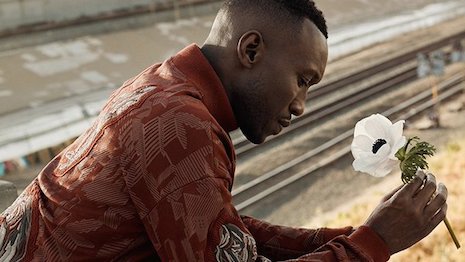 He loves me, he loves me not: Oscar-winning actor Mahershala Ali ponders the notion of masculinity in Zegna's latest installment of the #WhatMakesAMan campaign. Image credit: Zegna
He loves me, he loves me not: Oscar-winning actor Mahershala Ali ponders the notion of masculinity in Zegna's latest installment of the #WhatMakesAMan campaign. Image credit: Zegna
Exploring the evolving view of masculinity – by self-reflecting men and perceiving women – is key as gender identity has grown more fluid and society more accepting of self-definition.
Menswear brands such as Zegna have to keep up with the evolving definitions and perceptions.
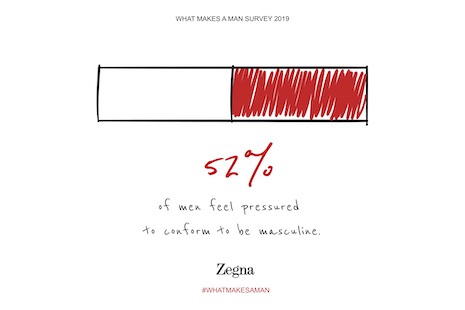 One out of two men feel pressured to conform to notions of masculinity. Source: Kantar study for Zegna
One out of two men feel pressured to conform to notions of masculinity. Source: Kantar study for Zegna
Indeed, the new research shed more light on the stereotypes men face as they deal with evolving norms and expectations.
For example, 70 percent of male participants are aware that they are playing into masculine roles in their everyday environments of work, home and time with friends.
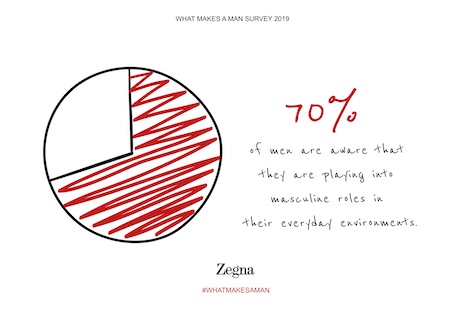 Playing into a masculine role. Source: Kantar study for Zegna
Playing into a masculine role. Source: Kantar study for Zegna
The same study found that 89 percent of male participants in China said they play up their masculinity at work, with 60 percent of male participants in the United Kingdom and 68 percent in the United States concurring with that view.
What this pointed to was that perceptions of masculinity continue to affect men’s actions as the result of social pressures to conform, according to the study.
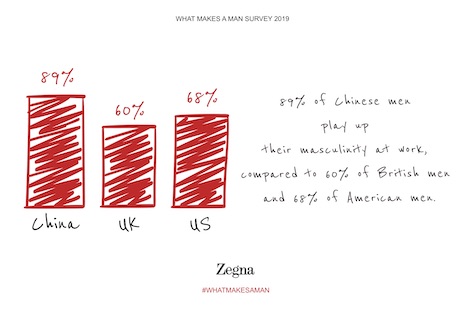 Chinese playing-up of masculinity at work was higher than counterparts in the United States and United Kingdom. Source: Kantar study for Zegna
Chinese playing-up of masculinity at work was higher than counterparts in the United States and United Kingdom. Source: Kantar study for Zegna
TRADITIONAL IDEALS certainly took a knock in the study.
More than 71 percent of male respondents said there should be more dialogue on the problems arising from current views of masculinity.
Not surprisingly, 60 percent of the survey’s male respondents saw the virtue of embracing qualities they view as traditionally feminine, such as sensitivity, but the majority still admitted to having difficulty in sharing their emotions with friends, according to the study.
Zegna's #WhatMakesAMan campaign: Artist Nicholas Tse says masculinity is a state of mind, not set of rules
{"ct":"RQHSl4FUW3eH7f3kffACjCUJtYZh6O3jEC5jJwbjdYsvR\/l6N6+b4b96ph\/KHlC7m3FiZHkuNyXS4bqCNA0vsRbYRFDKWLNhpqBfxWwOJaarcsqXat1qNrFgvrgZVMFJW9Rp6mimgZtXp+Crze7m+xmShrDBO8+7fXbiQnIM3B7yDeWERVx1NdBfepOD78ZrAsss4Z6ntV5bXjI95VIrCfL\/JWfKLE58VjDw6M\/5FIdywAegsJCbUfFd07NXMZlJid1JTXEOftpXsFFYh66Uhd\/k5xXcN8ZkiWuEJ7THndeoYcFKXqwBClTVaWMXQpQYcAcSfoRQcesTAh1gb6wgeFexQHYbGm\/s3j1M+8b0Mi+pBkoDGNB1big+rN+EhwJUdnnBWgqzpwcjM10xEs3DfFgdWwP6T4CwOo\/6uHE4soYFsLRvw8KIbyLk\/sGxwnfOqbcIkC6J37J0OWava4BRHrmTFQdMvKtIvf05gou\/UGumxt9eWWPzQT8t9DCL5FpivbmqVzSEI1KPfSEzb8WpA0Za4zUxw8v8bu7iaza5+ia8RD\/zE2eYCVhGIbrq2HMKHO0evQj0OaCm6RJAEWkrrlLTwpOzgMqrSCFW7+Uj0ReWoLj21pgJb2bR85THGMhKARoF2xggQ9Hfgulr2rNW+DCdThvx6\/LfD3mJerlbkDR0UMIBovbck\/cd8WMxGE6g+0khIPtgQn\/\/D5BjS8QWgCysHadqaqdzJw+QJpmYJGjW8MwzOhc5cpWKIVw1tYnHFy9GtXjsc1b9zSTDZi0QdDQLxNxjqXPmk6uekweZC0GP71oP5zV746XJc+wOdK+fDOz+fLuCJfn4Y27LpcPPbt7CnezICnZeoodEhp2YK2TfDQlQnnWi2TLz7mseOdZliZlQSWVvoSgKW7ecJa83uGMZnn9y\/EWICOOhRTdy\/TAc3jSJ0JdBT4EIBpuvHELnC9OQSsLq38TnQOmeiiNJf+\/v+Lg2+U7a49xMt1lT7Bz+JJc\/pc8GNy8OE3UPtWFVRT4R3VRsNj+IAGRgU\/snvGu9zdO\/XAwd8sHuKX3A9TETuXfYar6filDFDRjX7i6xyDVpvLrstFwjiJhKM3qSoUqkNeR6dM3tobWLkI57QjvlWUxyKW\/LG\/4GvTyNIpKw6RKjiQ3gvtodPzzU5Q6a1EmJ4LzL4+cjo9SEgYnpemtxS2vOYZFRk4QrQoZldkdbdJxKx+gEQoGXBV2hy0JH2k30yR\/FXSwJ\/9qqZ8+tlQWX476VCjU47DHVWc4ju9m8eEC\/iTfsIQ23sg9fWMQka+760jv3eFCWqN9SJ2w9G9sk2tqGNbTKFkZE8BrwUzZW2+B7839t4g\/A4Z9IJBVhO3VuWjfXZ\/aooTRGWXilkoQ\/Dl6FE0ghBSJipI8ZKDop5\/ibbBuWrtR36c3CAKh48v7Bnl4MGfT001QkQZ0y+pApwpphtPO0xeSJZIa7CtzJK29w9pchjgGOI6viLC79focVwArZLr0NwHowcMsi1Z\/\/rN64bDf3x80j6W6SKwBpjDRG8BToLvfuzoh8zb4EOI7p7CILBet3AdA6OcDh6swJ7WAIXr0v1z2tOUrVCQaQskyiZv83BkwPEMvXt43hB0LnbukxdHvQe\/NUTe1hxrYZoiqG0GESKJwNiEBeZuZSVqpqSSvcl27pKCQlFYgsjcHnQxtXUC7AOGEVMeQ82WTaprzo\/2GI5gtbFXJulWe46PAnehY5GUEe54rbYr8\/5c2WwKmhmDpVaY43w+0a189hwHveuGOMHipfjB1f\/QnjcyEVUpFQCqE4N\/vqlPPeiI6+bE16qltmMqOQM5ey+16gLOvlI26B7X7D6XnEr5Kw8mb3GeExUvL6PrUBpqmTwXcTAhvDjh97NWO47CzYqzZMfn3O14\/WTcX\/9V+7z2L\/Sa7SWssdut7jnje\/wIi2owUbEGN0t4G2ZnZ\/KRirpPCExy8CvOwvuyQgj2szTmZsxPgG0+rcV18BfPkXx6vO1gMZkC1AECihfEPdmQOHHyXqXAoxFkNbrSx3Xy5q\/RMketKG+2NRIsyuc8DZU+ILKvFmN4aa6RfHMeBOOIMSk4qb00rHAZwj1WgYkC27N\/NcmAVPDB+6TU+Wb51nhYVknnteRm9wCtAHeLO25++BQ4CESzczTwIHv2AD7ckTqEL05UpI9vO5tfyN+KTz\/RCe\/JwrIHpJzs2i1BpBWHzQjx9D7yVtUEoED7yABZWxJtgxzqbc8f2QATVR4ZKmpAifniznWKfK3FmC+ra5QzUSdUhqs6uTXfgnxx\/WMkekL3NafGJ0vkG+\/4727xvo6s\/9ABCesTe\/rsLHLXYdKer7TjV011bohIa1l1FlK3IcIEY41eoLWvtnzAl\/qkiWhM6ekbMpvg75Q7\/FSB5jhqzDleUVH\/qPsHHqlevCWPsrXiGhLlGWv2KqotNWAubnn6\/ANB21bZBBQAc+04mG4ezrjfvmcbMQP2Hy2Gbcppg1JA59Fgv8jbXCsQFbi+gVvCG5nXEOQziZY7fuf+PV55gKDGilpYMimRf6YGA+\/gPr5QckZB\/Lbs7CxpBV7QTFT8U6ob+GTGpOaorKvgVJkl6XJGr2l6d2IV6lNz3UCdHePwpwR13Zv9g7HhcqUbCoWc39OO3goJzI7DvZbc77jYkHzAnOJ3Dk1maf+quONhbxvlJbFriC5i1uGuDv4AyCALDq0jJ9\/BSX8p2lru6YtLnJjJ7C1gNW0jGBrxme+vhVt8WzPht7KwFmT7kUAQ0G9TSmUzYzYcfEM2jgiXhhqfs8GsDym+SjsLrMCszonwSNPZK8hFFFf2sINNcsoYvAA7qcmzWyrAPk7i++2OiuHHW8MOzzOuZiwRQqailqgmJVQ5LcFsblmqAOWeVPc\/LXn0ZW5pC4UeFEEKlRIVXIuK8UkytRZqxH0qBedo0ihO1URme58AtJdEVueCsb0GXsELRgfIpUGcQOkZCd8GynNCNVVWCR3J5xl6s3sawNYH6fuekorDFYERDHUnAdEoeyDgR9Knalc8wLP22pBqas9xEpU\/PSI+0w+sQb2BHqWX9\/FUolVhvtDWdcJBwh9isC3UK566hf7eMm3Da\/J2VV6sH7kNbDScdEuI5RQes\/T5oFHhUfQ7qymTWNs+9hXwXUyzuIh3za+M5BW22OvARbscrasaxAWEz3CuIJMKlFRAcr8VP3+v\/WLmB4QqsTJ8NjfcWphwL6GVD0FMqwlHTcMb5FGsdrTVMKrV8hyCkCFDoYnh92TNgfNOcB5Iw3fy3QFNU+4bjaWPwjmXoKa9XO+OjcJQFfiasVL+CaUsLd96VrzNjO1j92uDrk1tlyHhwSCja8+YrePzvMCQKWUVTWs4sruH3ySd8sH3gexz2dFkiDIjyldRcXxHf4aJhv+RgRyodnLy+Bk39TdE5bJamwZ3Fnu94YNSuJxneUjbJdCCSiDE+NdPhuaswPjFjp93iwNdZ4hQBv2sdk2PyaJc4T40qRG5hgsbXR\/Eq4Q42F4sR6W\/Jj\/684cLEZsnop3nsOXITfJhg9ZT6\/rCD1gKXvELM3yDR4AtWc\/qvOvNdwrGOyfTUzefUIkWpGnTjpjHRd+wm9VoaSju9Abs2zoK+xOHGLBQ\/IOEYwWXaRkKDFTdkqXxiQrtnAmYAqq7bqEdTr1BuXEnQg52a4G1DKONWaDC1C526blmmB+gr5lGoEyXMc6RzlZvMFKaqr13LrGmVtwco4B7R9a3Z0707fUavorPSq9ZQsNotZjFF9FZiUQrbwY\/FrDbM8aTNUCB+U8xpgyNE4eN76a460N3As83gNjvAao2ZuemerFYkdPPBEfevCSDeUT3fCuKfDuZKJCA4YjZcCpPbzwlr7aDZcN0nKUDE7cZ8mLlSjfGGrvyd+slaI151Mdp63AByKYoY9cSTJnOVpTHtBpW\/7T2tnsOzrkBso+tXnHsk1pnzSqnC8ukDHycxiPw7894ai7VoRm\/1T6nyCtkxtLDWy\/evNI0sQ13XpVlAgJWETr9Nw792nSXH6mL0xum7OIlsObue0Y0rnmuKKq5ABmxpx7FdEIGZiXWnQCxn5tT7ZuuBwkWnu2CeTPKsE+pquP7u2HTo5ZeUpGKNa+yo9z6m8WsLJr0irOxp9Ty0G5hRnXrHjlriSMotGRCTs4Z7gi0mN\/uOXaXzxvWs7+9XgGFQPPMbP7h2hA5HAPDVICbn7zNRKdHEDaBjvdJVVzwyPOcBwLlrBTuH4Ru1bglON7nPchsS3IiCTjjhh6IRxb2PQGv1Q9cMDPUC5XcVTYCkBFsvkbiwZ5ZRuSiVr3wllttTBNuYF+xJXXAjnmvB6gmYWGR+QfIRR8F7nBhVFPZ0SgFnSs59fEZRniWs2Tzg3AzGsTCPvJNccncLboaEEjp+7LSxnFhmGcbjSHhS8lh2QmOOWqfmQ4FHdhFRhyKk03DIqFyyB0fb8kvq6hR49sfaW5jD9swCEG3uLp7uQnVP8bk6I0+LPgwOvDNtegbx8ARBPUGYR8Z6JCNonBW3ewxJES6kLinx1cjl6Zc6SaAb88pGMDA4\/X5hcWcn56ZyTuhxZsTw+l9zqIm0z7\/F\/MoWbs4qaaSDu2\/2jftdIetHBeosjUTao0Brcuj9XESJGrF\/goLaD3yEKnDJvJKTgm3RkPl4Y0J6c6rXtGTx5sSIa3Nm6a7A\/R3\/wfONnq+pbwkRUTIabalcHG7ZVb4K8VvDofMG\/eM94nYlj53QkbIqk6mXkrTeZZkA8Tc1MTsXiMIbgMBvulqerxDB5nPlS9\/3IV8sOegK3wdpX2s4y5Fq8HxclRgIkTGksGzCkOsIKvMxVOpqmM009tuDnR86OyWatL+rWDj41UU9SJAmHCa8q0RrYTiRav4SQrBUc4yZbxSQXhr54pSqI81qPKYglAgXMdeaimBM3lWDAJU1+ZcN0ZGmCOnachiX7kGlqLKd7IpQiiNE0lvkFW6c0Hcgua8XQo\/zgorBCDHi8i2wj0HvhiYqE8Ys9WVZljbnT11hSLwgswsc+jo16PvEGK4HoCpxj+3WVxaqy86vjtj5pgRSAnuyMIF49Z+yo5f5mo7eapEnaUcJdmfHnaiwfeUmSPBeiwq3VCLDqHaUZhVp7cRxBQHG7DObYhoPVEgcmXm1W\/sXWUFfV2s6pKQZUPsMlI0xkSsL9+kQpuOFTp+u\/RYFFB\/0wWrRxr5Szzv\/CjUjO3667VKm\/N9XM561Zd+mw+PdZRygUH+wZ6k4N0bKUEL2y1iR+asEQ2Vl8V5nx0YujfJPzkeOIdm6ntPDJ1lvWy1joSQDDpxFhx8Wd2gGY2kqKt6ZJlea2HTLO\/XFGfqrVELv0vJFim+3YWnMdoi7tu7H3JDRpXVdLhrFeSf8Ll1bCumaVNdxaYKMOSwI29omyPuuAYNyC03nFigUCuez4OatVFPoPTfdwXXZ283KfQ0xXimsL+UPVoKoxTst6o0ETLbrakTtBGdIuhzUIzBmtmA6pqa2rcypYPciiyUOgpxf\/OVQTRQmR3aHp6ElUoZJcLb8UJEO4Tjq\/fvUbEhVTfA5fUjlUF7US4J9EKSoF0Cgu2taI\/3KKdj2gp+jvsuLKHSu351MWwE3GrVdY9iCvVPjmxE5WTOJ2xoNb6H1DlCJmNsMfF29DO7nXjySzdu4pHoSTQ01Oo9eP7OHk3cJxPhfj4xGqlJ\/MH3tHJ8hM4auB7WazIAUIiHipHVrV6MltuicsNe4w3dPkxRDr+khaL9ZOXSxpMLEN2sVpSkXYNqPaNhC3gZkJdSprWvQnk271DwlUHz4d5WhpGTMTO3n6kWEyT4+6ffizB9pu0t2Wgc8\/T6fYTuhjwvYqoZl9n2s4YP9yC+NslqxWQ8b3C+hOqmr6cc6ud06k0rr+sx0wKz5uBzg9Cgd7SE8RI2Bq3ohtknLPFn\/jKAwbKRdBH42mHX8DoZNPlqMjsBqWxRQfGth9BLAtbohqQU8w5DZS7TLCMatIqUrN0ZI41Re5wPpeJTq0pGSICt0iinrqyzVFveLYskjbQrYfFuzzWXeECvVUcZbPxOaYRrflfpGlcAr\/XTyHsJNtdGjCZANNQIxMQW1rpz9HeArLSP56MFFWwSdrHrOQ2+CwiXK2rf3vvpLSasMdf1TnxA+DH+jLXv7L5dfOpQIANkY2eFtDAi8WlRR9ewpqgCk9SEHUnKErsL6lFjH7XzxVtR1R8lf2R7Jimukke46+2H929OWBs1NY0+b8KBiovVo9qduC5zjwfV\/0N6mQdKtCRtsAqJYhU8XNWiFtOgpKhWSjkxJm6kgXf\/qYrEyE3BoVbuehqp5P\/XLYTDpQ732EBMos\/z4noAWxKtHvbTUiJv+zqge4umieD3qRXcxbS51dXmKHc61+DrWmDnrKZcyo2kjzDKmSaxFWpmYAuGBxac5vZv3Ntpz+1tJ6+wEwTlHpBfxUTHzM2ynskyjT\/NwIvHVvdxX8bbe\/Gj8KHdyA0fQoHM\/LRy+xT94acDCCtWW9rNT3YKbrkXPjzRdrqwn32zuTTfLP+Gvzl5xBzUnjn6pMRbxdJ2NmnRghIzY3bGknwHqnZgPseNXKfZqi2u4\/0im4U0OUeG0o0moSxzkZW2fLBavOv9RpX+ltLNWrfvtQ8wcmraF3sfUmLT0HjVw22JIf0TR6or4ZyoaiF6jorlX\/mTYnHXHDviLExsCzZOw660uH4wNIuy+ThBN2mPRUMaBpn7kh3jO6HluRLEf44f1tZLPnTAtlianRC62+y9L5NHu8udRyIsIveuONcSpYVU1NJQTD3aFfhEZVVpEoIZDXdRe9ykLFsDDp5LWmeT5pPn6sEF1CmwzcpI9fCsrWHaAGekR+yNomr+Uub09Ct33F6KIUHxLE3tW\/g4cl23uMEGqwri3p6l\/DIXIOJQw3mMgc2BT70Akn8wAtGjG7cl78HP4KbvmKsUBYO7V24eKCv0d4HMsD\/ppR4DlGP9v7GriVgL0q3cW2","iv":"9d71033dd46e8b6164755c826f4f9c64","s":"d8385550a04ed295"}
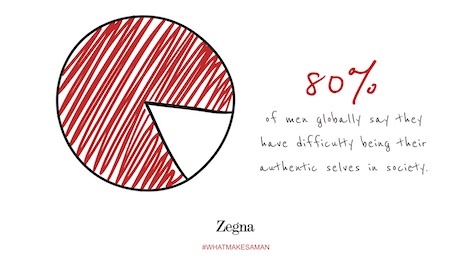
 Four out of five men have difficulty being their authentic selves in society. Source: "What Makes a Man 2019 Survey" by Kantar for Ermenegildo Zegna. Image credit: Ermenegildo Zegna
Four out of five men have difficulty being their authentic selves in society. Source: "What Makes a Man 2019 Survey" by Kantar for Ermenegildo Zegna. Image credit: Ermenegildo Zegna
 He loves me, he loves me not: Oscar-winning actor Mahershala Ali ponders the notion of masculinity in Zegna's latest installment of the #WhatMakesAMan campaign. Image credit: Zegna
He loves me, he loves me not: Oscar-winning actor Mahershala Ali ponders the notion of masculinity in Zegna's latest installment of the #WhatMakesAMan campaign. Image credit: Zegna One out of two men feel pressured to conform to notions of masculinity. Source: Kantar study for Zegna
One out of two men feel pressured to conform to notions of masculinity. Source: Kantar study for Zegna Playing into a masculine role. Source: Kantar study for Zegna
Playing into a masculine role. Source: Kantar study for Zegna Chinese playing-up of masculinity at work was higher than counterparts in the United States and United Kingdom. Source: Kantar study for Zegna
Chinese playing-up of masculinity at work was higher than counterparts in the United States and United Kingdom. Source: Kantar study for Zegna